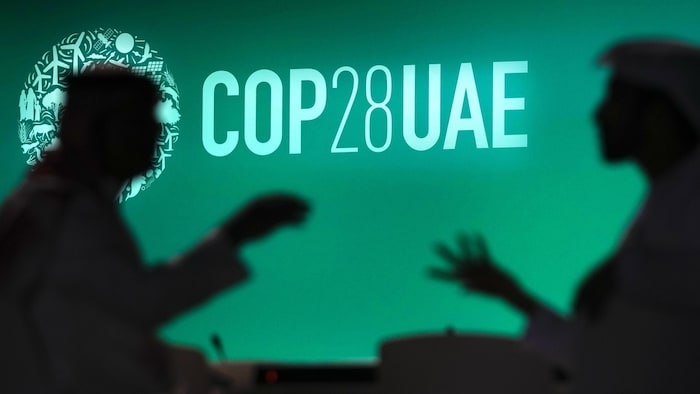Open in full screen mode This compromise text, the result of difficult negotiations, will have to be approved by nearly 200 countries by consensus. Radio-Canada Speech synthesis, based on artificial intelligence, makes it possible to generate spoken text from written text. The Emirati presidency of COP28 on Wednesday unveiled a new compromise plan to unblock the Dubai climate talks, calling on countries around the world to “transition away from fossil fuels” with the aim of reaching carbon neutrality by 2050, in line with climate science. The document, whose publication was awaited all night by sleep-deprived negotiators, proposes climate conferences for the first time in history of the United Nations to mention all fossil fuels, largely responsible for climate change, in a decision to be adopted by all countries. The text, every word of which was negotiated by Emiratis, calls for transitioning away from fossil fuels in energy systems, in a fair, orderly and equitable manner, accelerating action in this crucial decade, in order to to achieve carbon neutrality in 2050 in accordance with scientific recommendations. The call to accelerate action in the current decade was a demand of the European Union and many others country. But he is no longer talking about an exit from oil, gas and coal, as demanded by more than a hundred countries. Consult the complete file View full file FollowFollow To make history, this compromise text, the result of painful negotiations between the European Union, small island countries, the United States, China and Saudi Arabia, will have to be approved. by nearly 200 countries by consensus. The Presidency convened a plenary session at 9:30 a.m. local time for this purpose, the day after the scheduled end of COP28, chaired by the Emirati Sultan Al Jaber, boss of the Emirati oil company Adnoc. Only one country can object to the adoption of a decision at the COP, according to UN Climate rules. Sultan Al Jaber had been striving for more than 24 hours to save a COP that he had announced as a turning point, capable of preserving the most ambitious objective of the Paris agreement, adopted eight years ago: limit global temperature rise to 1.5°C. 
COP28: climate summit in Dubai
COP28: climate summit in Dubai
COP28 President Sultan Ahmed al-Jaber
The first draft Emirati text, on Monday, sparked an outcry for failing to call for an exit from fossil fuels, the combustion of which since the 19th century is largely responsible for the current rise in global temperatures of 1. 2°C, compared to the pre-industrial era.
We are making progress, John Kerry, the US climate envoy, declared on Tuesday evening, heading towards yet another consultation. Good progress is being made, said Australian Climate Minister Chris Bowen.
Around 130 countries (European Union, island states, United States, Brazil, etc.) demanded an ambitious text sending a clear signal to initiate decline fossil fuels.
To date, only the reduction of coal had been recorded at COP26 in Glasgow. Oil and gas had never been designated.
In the Emirates' draft agreement there is recognition of the role played by transition energies, referring to gas, in ensuring the energy security of developing countries , where nearly 800 million people lack access to electricity.
The text contains multiple energy-related calls: tripling renewable energy capacity and doubling the rate of improvement in energy efficiency by 2030; accelerate zero-carbon and low-carbon technologies, including nuclear power, low-carbon hydrogen, and the nascent carbon capture and storage, championed by oil-producing countries to be able to continue pumping hydrocarbons.
Saudi Arabia, Kuwait and Iraq were on a hard line, refusing any agreement tackling energy fossils which make them rich.
Since a conference in Doha, Kuwaiti Oil Minister Saad al-Barrak denounced on Tuesday an aggressive attack by the West.
Some of the countries most in favor of an oil exit have signaled that they are prepared to sacrifice the term, in exchange for an oil exit. significant commitments.

